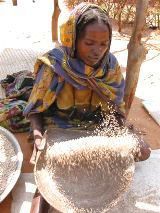UN worried by rising tensions in Chad over Darfur refugees
NDJAMENA, Sept 22 (AFP) — The United Nations warned Wednesday that the mass influx of refugees from Sudan’s Darfur region was stoking tensions in Chad amid reports of an increasing number of attacks against women who have fled the world’s worst humanitarian crisis.
 There are currently about 190,000 refugees from Darfur in Chad, Sudan’s impoverished arid eastern neighbour, according to Jean-Marie Fakhoury, director of UN operations in both Sudan and Chad.
There are currently about 190,000 refugees from Darfur in Chad, Sudan’s impoverished arid eastern neighbour, according to Jean-Marie Fakhoury, director of UN operations in both Sudan and Chad.
But, he added, a “provisional contingency plan to house an additional 100,000 people” was being drawn up.
“In the beginning, the Chadians were very generous sharing their meagre resources with the refugees,” he said, adding that resentment has since built up slowly among locals in Sudan’s western neighbour, one of the world’s poorest and most arid nations.
“Soon the refugees were lodged in camps and were getting food while the locals were getting none. The rains this year are one-third of what they are normally and there has not been a good harvest. The lack of water and firewood has not helped either.”
Fakhoury said there had been growing reports of refugee women being attacked, sometimes raped, when venturing out from the camps to gather firewood and water but added that they sometimes vandalised Chadian properties, taking wood from perimeter fences.
“In many areas, the refugees form 30 percent of the population and in some spots they outnumber the locals by three to one,” he said.
To add to the proglems, the UN does not have enough money at its disposal.
“We only have 50 percent of our requirements,” he said. “We had budgeted 54 million dollars for this year but we revised it to 114 million because of the extremely hostile conditions in Chad,” he said referring to the almost non-existing infrastructure in Chad.
A war in Sudan’s western Darfur region, one of the country’s most marginalised regions, was fueled by a black-led rebellion against Khartoum, which responded by giving Arab militias known as the Janjaweed a free rein to crack down on the rebels and their supporters.
In 19 months since the start of the conflict, some 50,000 people have been killed, according to UN estimates, and well over a million displaced.
There are currently 10 refugee camps in Chad and the UN is trying to move many refugees living in makeshift shelters along the 600-kilometre (375-mile) border to avert cross-frontier raids blamed on the Janjaweed.
Some of the camps are stretched well beyond their limit, like the one at Bredjing — almost opposite another giant refugee camp in Sudan called El-Geneina.
Bredjing houses 40,272 people — more than double its capacity.
Guillermo Bettocchi, UN deputy representative on protection, said cross-border attacks from Sudan had decreased.
“The last one happened about three weeks ago when a group came into a town and attacked a house and killed four brothers,” he said.
But with patrols by the French military, soldiers from the African Union and a stepped up Chadian force, these have come down, he said, stressing that earlier raids mainly targeted cattle owned by the refugees.
Worries about the crisis have sharpened over the fact that Chadian President Idriss Deby is increasingly facing a difficult situation over the growing local resentment of the refugees.
Deby, who is a member of the Zakhawa ethnic group — the first wave of people to cross the border into Chad — is further hamstrung by the fact that he planned the coup which brought him to power in 1990 from Sudan and, according to many here, with the help of the Sudanese authorities.
They say he cannot take the risk of upsetting the Sudanese government too much.
In May, Deby demanded that Sudan’s government halt attacks against Chad by the Janjaweed, and the following month, he urged the international community to act quickly in Darfur to avoid a “humanitarian tragedy” in the western part of Sudan.
Sudan has brushed off recent US accusations of a “genocide” in Darfur and slammed a UN resolution threatening sanctions as “unjust” but agreed to work towards improving security in the region.
